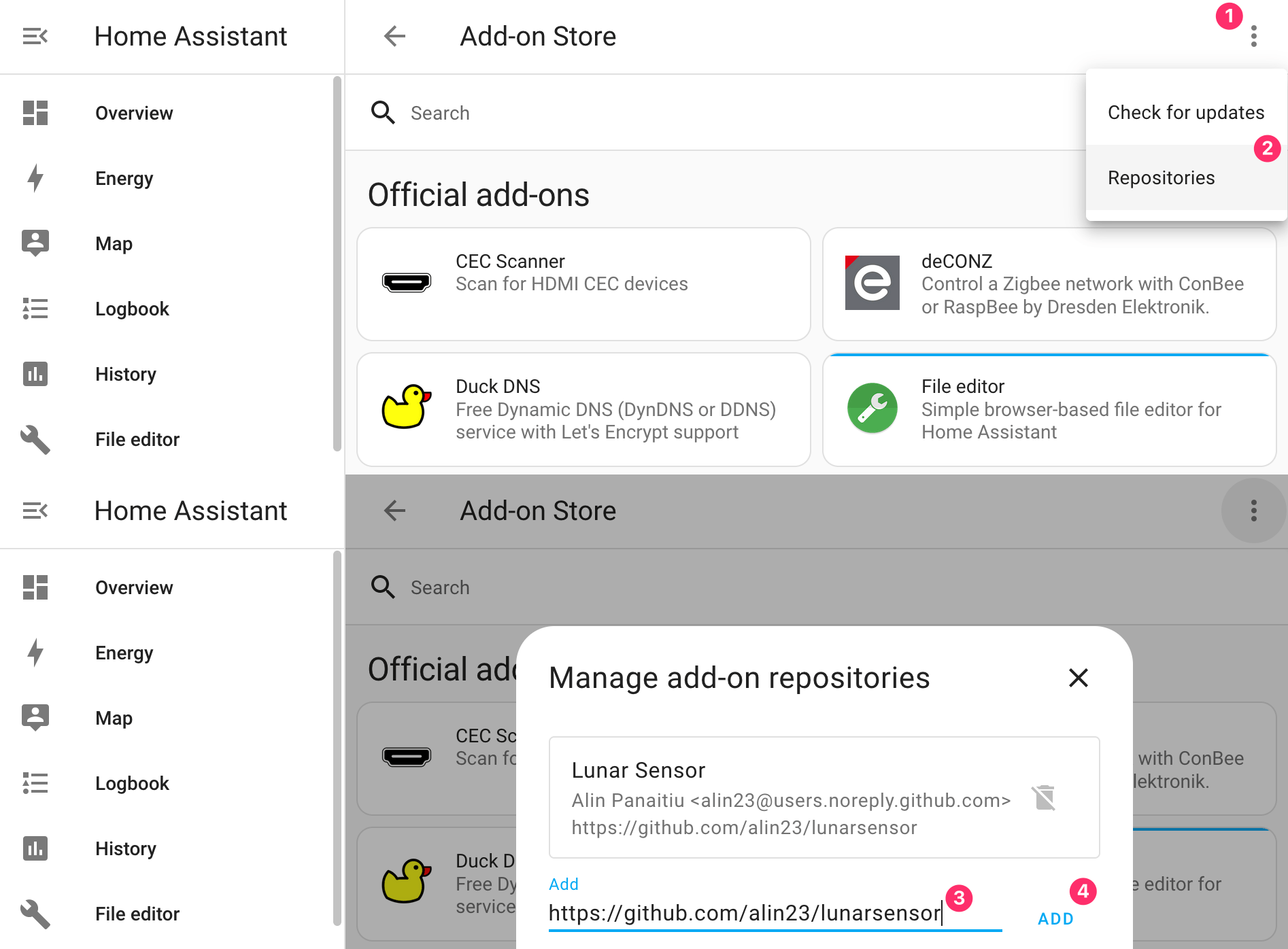lunarsensor
说明: 模拟月球环境光传感器的服务器,支持多勒克斯数据源
(Server that mimics a Lunar ambient light sensor, with support for multiple lux data sources)
(Server that mimics a Lunar ambient light sensor, with support for multiple lux data sources)
文件列表:
Makefile (340, 2023-08-23)
homeassistant_addon (0, 2023-08-23)
homeassistant_addon\DOCS.md (2595, 2023-08-23)
homeassistant_addon\Dockerfile (212, 2023-08-23)
homeassistant_addon\build.yaml (267, 2023-08-23)
homeassistant_addon\config.yaml (522, 2023-08-23)
homeassistant_addon\icon.png (6530, 2023-08-23)
homeassistant_addon\local_server.py (78, 2023-08-23)
homeassistant_addon\logo.png (18257, 2023-08-23)
homeassistant_addon\lunarsensor.py (2253, 2023-08-23)
homeassistant_addon\requirements.txt (67, 2023-08-23)
homeassistant_addon\run.sh (132, 2023-08-23)
lunarsensor.py (1659, 2023-08-23)
repository.yaml (126, 2023-08-23)
requirements.txt (67, 2023-08-23)
homeassistant_addon (0, 2023-08-23)
homeassistant_addon\DOCS.md (2595, 2023-08-23)
homeassistant_addon\Dockerfile (212, 2023-08-23)
homeassistant_addon\build.yaml (267, 2023-08-23)
homeassistant_addon\config.yaml (522, 2023-08-23)
homeassistant_addon\icon.png (6530, 2023-08-23)
homeassistant_addon\local_server.py (78, 2023-08-23)
homeassistant_addon\logo.png (18257, 2023-08-23)
homeassistant_addon\lunarsensor.py (2253, 2023-08-23)
homeassistant_addon\requirements.txt (67, 2023-08-23)
homeassistant_addon\run.sh (132, 2023-08-23)
lunarsensor.py (1659, 2023-08-23)
repository.yaml (126, 2023-08-23)
requirements.txt (67, 2023-08-23)
Lunar Sensor
Create a custom Ambient Light Sensor on any device
--- This is a server that implements a custom Ambient Light Sensor for adapting monitor brightness with the [Lunar macOS app](https://lunar.fyi/). ### Requirements * Python 3.6+ ### Running the server ```sh # Installs dependencies and runs the server make # Runs the server without installing dependencies make run # If IPv6 is not available use HOST make run HOST=0.0.0.0 # Listen on another port using the PORT variable make run PORT=8080 ``` --- ### Implementing light sensor reading The file `lunarsensor.py` contains a server that reads [lux](https://en.wikipedia.org/wiki/Lux) values using the [`read_lux()`](lunarsensor.py#L53-L57) function at the bottom of the file. Your actual sensor reading logic should be written in that function. #### Testing the server * Check if one-shot lux reading works ```sh curl lunarsensor.local/sensor/ambient_light {"id":"sensor-ambient_light", "state":"0 lx", "value":0.000000} ``` * Check if the EventSource is sending lux values every 2 seconds ```sh curl -N lunarsensor.local/events event: state data: {"id": "sensor-ambient_light", "state": "400.0 lx", "value": 400.0} event: state data: {"id": "sensor-ambient_light", "state": "400.0 lx", "value": 400.0} event: state data: {"id": "sensor-ambient_light", "state": "400.0 lx", "value": 400.0} ``` --- ### Implementation examples #### 1. [HomeAssistant addon](homeassistant_addon) An easily installable addon that runs the server on port 8899 and polls a sensor entity for lux values. [](https://my.home-assistant.io/redirect/supervisor_store/)  #### 2. Reading from a [BH1750](https://learn.adafruit.com/adafruit-bh1750-ambient-light-sensor) I2C sensor ```sh pip3 install adafruit-circuitpython-bh1750 ``` ```python # Do the sensor reading logic below import board import adafruit_bh1750 i2c = board.I2C() sensor = adafruit_bh1750.BH1750(i2c) def dynamic_adjust_resolution(lux): if lux > 300: sensor.resolution = adafruit_bh1750.Resolution.LOW elif lux > 20: sensor.resolution = adafruit_bh1750.Resolution.MEDIUM else: sensor.resolution = adafruit_bh1750.Resolution.HIGH async def read_lux(): lux = sensor.lux dynamic_adjust_resolution(lux) return lux ``` #### 3. Reading from a [VEML7700](https://learn.adafruit.com/adafruit-veml7700) I2C sensor ```sh pip3 install adafruit-circuitpython-veml7700 ``` ```python # Do the sensor reading logic below import board import adafruit_veml7700 i2c = board.I2C() sensor = adafruit_veml7700.VEML7700(i2c) def dynamic_adjust_resolution(lux): if lux > 300: sensor.light_integration_time = adafruit_veml7700.ALS_25MS sensor.light_gain = adafruit_veml7700.ALS_GAIN_1_8 elif lux > 100: sensor.light_integration_time = adafruit_veml7700.ALS_50MS sensor.light_gain = adafruit_veml7700.ALS_GAIN_1_4 elif lux > 20: sensor.light_integration_time = adafruit_veml7700.ALS_100MS sensor.light_gain = adafruit_veml7700.ALS_GAIN_1 elif lux > 10: sensor.light_integration_time = adafruit_veml7700.ALS_200MS sensor.light_gain = adafruit_veml7700.ALS_GAIN_1 else: sensor.light_integration_time = adafruit_veml7700.ALS_400MS sensor.light_gain = adafruit_veml7700.ALS_GAIN_2 async def read_lux(): lux = sensor.lux dynamic_adjust_resolution(lux) return lux ``` #### 4. Reading from a [HomeAssistant](https://developers.home-assistant.io/docs/api/rest/) lux sensor ```python # Do the sensor reading logic below HOME_ASSISTANT_URL = "http://homeassistant.local:8123" # Replace with your HomeAssistant server URL TOKEN = "your.jwt.token" # Replace with your long-lived HomeAssistant API token SENSOR_ENTITY_ID = "sensor.living_room_ambient_light" # Replace with your sensor entity id async def read_lux(): async with CLIENT.get(f"{HOME_ASSISTANT_URL}/api/states/{SENSOR_ENTITY_ID}", headers={"Authorization": f"Bearer {TOKEN}"}) as response: sensor = await response.json() if not json: return None return float(sensor["state"]) ``` --- ### Pointing Lunar to the sensor server Lunar expects to find the sensor at the `lunarsensor.local` address by default. This can be changed using the `defaults` command on the Mac where Lunar is running. There are three settings that affect where Lunar looks for the sensor: - `sensorHostname` set by default to `lunarsensor.local` - `sensorPort` set by default to `80` - `sensorPathPrefix` set by default to `/` For example, if you would like to have Lunar listen for sensor events at `homeassistant.local:8123/lunar/events` you would run the following commands: ```sh defaults write fyi.lunar.Lunar sensorHostname homeassistant.local defaults write fyi.lunar.Lunar sensorPort 8123 defaults write fyi.lunar.Lunar sensorPathPrefix /lunar ```近期下载者:
相关文件:
收藏者:
